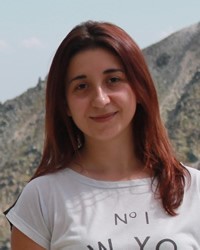Bulgarian in Ukraine

Photo Source:
Радост Тодорова - Pixabay
|
Send Joshua Project a map of this people group.
|
| People Name: | Bulgarian |
| Country: | Ukraine |
| 10/40 Window: | No |
| Population: | 164,000 |
| World Population: | 6,744,300 |
| Primary Language: | Bulgarian |
| Primary Religion: | Christianity |
| Christian Adherents: | 80.00 % |
| Evangelicals: | 1.90 % |
| Scripture: | Complete Bible |
| Ministry Resources: | Yes |
| Jesus Film: | Yes |
| Audio Recordings: | Yes |
| People Cluster: | Slav, Southern |
| Affinity Bloc: | Eurasian Peoples |
| Progress Level: |
|
Introduction / History
Ethnic Bulgarians trace their history to the late 7th century, when the Bulgars, a central Asian Turkic people, and the Slavs, a central European people, merged to form the first Bulgarian kingdom in what is now northeastern Bulgaria. In the following centuries, they struggled with the Byzantine Empire for control of the Balkans, only to be overrun by Ottoman Turks towards the end of the 14th century. Northern Bulgaria attained autonomy in 1878 and the entire country of Bulgaria became independent from the Ottoman Empire in 1908.
After fighting on the losing side of both World Wars, Bulgaria fell within the Soviet sphere of influence and became a People's Republic in 1946. Communism fell in 1990, and Bulgaria began moving towards political democracy and a market economy while combating inflation, unemployment, corruption and crime. Bulgaria joined the North Atlantic Treaty Organization (NATO) in 2004 and the European Union (EU) in 2007.
Bulgaria has a weak economy, partly because of their communist past and partly because of corruption. For this reason, Bulgaria has a negative net migration rate. A significant percentage of Bulgarians are recent emigrants to Western Europe and North America. Part of this diaspora consists of ethnic Bulgarians who permanently emigrated in the early 1990s after the fall of communism. Others have become temporary workers in other countries.
There is a significant number of Bulgarians in southern Ukraine, especially in the city of Bolhrad. Many also live in Bessarabia and the Pryazovia. Bulgarians started to settle in certain parts of Ukraine in the 1700s to escape the Ottoman Empire. They formed their own towns and were given land to farm. In the 1800s more Bulgarians came to Ukraine, but in 1878 the entire region was taken by the Russian Empire.
What Are Their Lives Like?
For decades Bulgarians in Ukraine have been famous for making wine. These Bulgarians have a diet rich in dairy products and pastries. Many of Ukraine's Bulgarians are in areas controlled by the Russian military. Since that time, the Russians have stopped the Bulgarian language publications. Most of these Bulgarians have Bulgarian rather than Ukrainian as their mother tongue.
What Are Their Beliefs?
The Bulgarian people have been Orthodox Christians since 865 A.D. However, the political and cultural dimensions Bulgaria's Orthodox Christianity have typically been more prominent than the spiritual ones. This was true from the beginning, as the Bulgarian king's decree of mass conversion to Christianity was motivated by favorable trading and international relationships. During the almost 500 years under the Ottoman Empire, the Orthodox Church continued to be a primary means by which Bulgarians maintained their cultural identity. Even under communism, the Orthodox Church remained a strong cultural anchor for ethnic Bulgarians.
Today, most ethnic Bulgarians identify themselves as Orthodox Christians, even to the degree that Orthodoxy is seen as an indivisible part of their cultural identity. However, while religious holidays and saint-days are prominent aspects of the culture, regular church attendance is extremely low. Religious syncretism is common, drawing together aspects of Christianity, animism and the occult. Non-Orthodox ethnic Bulgarians include Catholics and Protestants, each representing a slight percentage of the population.
What Are Their Needs?
Ethnic Bulgarians' biggest felt need is for economic security. This is fueling both urbanization and emigration, as people increasingly relocate to larger cities inside and outside of the country in search of work. While some find it, however, many ethnic Bulgarians remain chronically un- or under-employed. This compounds other stresses, especially for families raising children and caring for grandparents.
The even greater need, however, is for people to know and follow God through his son Jesus Christ. Very few ethnic Bulgarians are active in the life of a church, whether Orthodox, Catholic or Protestant. This spiritual vacuum is being filled with consumerism, folk religion and other barriers to the gospel.
God is at work among ethnic Bulgarians, and He continues to do so through his church. However, many ethnic Bulgarians have been unimpressed – if not alienated – by evangelistic methods that appear foreign and overly aggressive.
Prayer Points
Pray that Bulgarians will regularly witness Christians living in joyful obedience to Jesus Christ, leading them to embrace the cross and the empty grave.
Pray that Bulgarian Christian believers develop culturally relevant church and church-planting models to reach the "new Bulgarians"—middle class, post-modern thinkers, etc.
Pray that Bulgarians will put their hope and trust in Jesus Christ, not a religious institution.